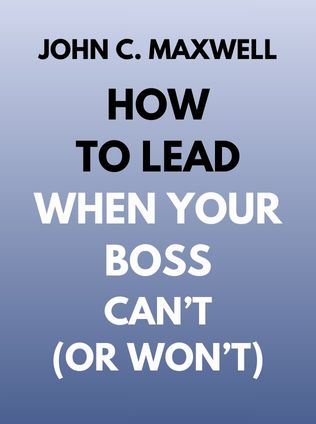
How to Lead When Your Boss Can’t (or Won’t)
By John C. Maxwell
Published 10/2019
About the Author
John C. Maxwell is a renowned leadership expert, speaker, and author who has sold more than 30 million books in 50 languages. Recognized as the number one leader in business by the American Management Association and as the most influential leadership expert by Business Insider and Inc. magazines, Maxwell has had a significant impact on leadership development worldwide. He is the founder of the John Maxwell Company, the John Maxwell Team, EQUIP, and the John Maxwell Leadership Foundation, which have collectively trained millions of leaders. His work is centered on helping individuals and organizations unlock their potential through effective leadership.
Main Idea
In "How to Lead When Your Boss Can’t (or Won’t)", John C. Maxwell addresses the common dilemma faced by many professionals: working under ineffective or incompetent leadership. Adapted from his successful book "The 360-Degree Leader," this work provides practical strategies for navigating the challenges of having a bad boss. Maxwell emphasizes the importance of self-leadership, maintaining a positive attitude, building strong relationships, and developing influence regardless of one's position within the organization. The book offers guidance on positioning oneself for future success while handling the current difficulties posed by inadequate leadership.
Table of Contents
- Introduction: The Leadership Dilemma
- What Happens When Bosses Don’t Lead
- Lead Yourself Well Before Anything Else
- Find Ways to Work With Your Boss
- Develop Your Influence Wherever You Are
- Avoid Landmines That Could Make Your Situation Worse
- Prove Your Worth Daily and Never Stop Growing
Introduction: The Leadership Dilemma
Millions of people are held back by incompetent leaders every day. John C. Maxwell recognizes this and offers insights into leading effectively even when your boss isn't up to the task. He presents principles that can help individuals navigate the challenges of working under poor leadership, ensuring personal and organizational success.
What Happens When Bosses Don’t Lead
Maxwell illustrates the inevitable consequences of poor leadership, which include delayed decisions, multiplied agendas, extended conflicts, low morale, reduced production, and hindered success. One of the most detrimental effects is the erosion of organizational vision. Without a competent leader to maintain and drive the vision, teams lose direction and purpose.
He categorizes bad bosses into several types:
- Insecure Leaders: They view everything through a filter of self-centeredness. Their lack of confidence often results in them undermining others to feel more secure in their position. This insecurity breeds a toxic work environment where team members are constantly vying for approval rather than collaborating effectively.
- Visionless Leaders: They lack direction and passion, leaving their teams without motivation. A visionless leader's inability to set a clear path forward results in stagnation, where employees feel unmotivated and unsure of their roles and future within the organization. The absence of a compelling vision means that goals are often ambiguous, leading to decreased productivity and morale.
- Incompetent Leaders: Their inefficiency burdens the entire team. Incompetent leaders are often promoted for reasons other than their ability to lead, such as tenure or connections. Their lack of skills and knowledge forces their teams to compensate, creating an environment of frustration and burnout. These leaders often make poor decisions, further complicating tasks and projects.
- Self-centered Leaders: They advance at the expense of others. Self-centered leaders are more concerned with their own career progression than the well-being of their team. They take credit for successes and deflect blame for failures, eroding trust and respect among their subordinates. This behavior stifles innovation and teamwork, as employees are less likely to take risks or share ideas.
- Chameleon Leaders: Their unpredictable behavior wastes valuable time and energy. Chameleon leaders change their stance and personality based on who they are interacting with, making it difficult for team members to predict their actions and decisions. This inconsistency leads to confusion and wasted effort as employees try to anticipate and adapt to the leader's shifting expectations.
- Political Leaders: Their decisions are driven by personal ambition rather than organizational goals. Political leaders prioritize their own advancement over the success of the team or company. They engage in manipulative tactics and form alliances based on power dynamics rather than merit. This creates a cutthroat environment where employees feel pitted against one another, detracting from collaboration and productivity.
- Controlling Leaders: Their micromanagement creates a stifling work environment. Controlling leaders are unable to trust their team members to complete tasks independently. They insist on overseeing every detail, which stifles creativity and autonomy. Employees under such leadership often feel demoralized and disengaged, leading to higher turnover rates and decreased overall performance.
Lead Yourself Well Before Anything Else
Self-leadership is crucial for personal success and for managing difficult situations at work. Maxwell emphasizes that leading oneself well builds credibility and reduces friction with others, including one's boss. Key aspects of self-leadership include:
Credibility Through Self-Management
Self-management involves making key decisions and managing them daily. This includes:
Sign up for FREE and get access to 1,400+ books summaries.
You May Also Like
The Subtle Art of Not Giving a F*ck
A Counterintuitive Approach to Living a Good Life
By Mark MansonRich Dad Poor Dad
What the Rich Teach Their Kids About Money - That the Poor and Middle Class Do Not!
By Robert T. KiyosakiHow To Win Friends and Influence People
The All-Time Classic Manual Of People Skills
By Dale CarnegieQuiet: The Power of Introverts
The Power of Introverts in a World That Can't Stop Talking
By Susan Cain



















